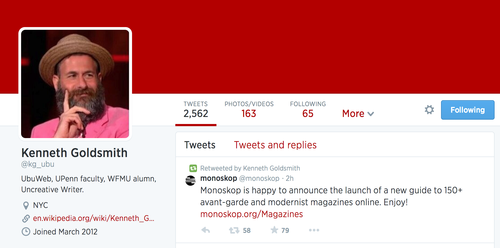
In the final installment of What Would Twitter Do?—where I talk to some of my favorite people on Twitter about their tweeting philosophies and practices—I interview Kenneth Goldsmith. Kenny is the creator of the avant-garde encyclopaedic archive project, UbuWeb. He is also the author of a book of essays called Uncreative Writing and many experimental books, including one in which he transcribed every word he said in an entire week, Soliloquy, and another in which he wrote out an entire day’s New York Times. He also created the project Printing Out the Internet for which he invited people around the world to help him do just that; he collected over 10 tonnes of paper from 20,000 contributors. He is the editor of a collection of interviews with Andy Warhol, I’ll Be Your Mirror, and is the first poet laureate at MoMA. We spoke this morning over gchat.
—Sheila Heti
SHEILA HETI: You said that if any artist could make a work of art as great as Twitter… Well, not exactly that, but can you tell me if you think of Twitter as art?
KENNETH GOLDSMITH: Twitter is not art. But it inspires me in the way that art used to inspire me. Art used to make me see the world differently, think about things in a new way—it rarely does that for me anymore, but technology does that for me on a daily basis. Rather like the feeling when I first saw a Dan Flavin fluorescent tube. It made me rethink the entire world. It’s Twitter’s combination of simplicity and complexity that is astonishing in the same way that minimalist sculpture was inspiring and enlightening.
SH: How do you think of your own work differently since being inspired by Twitter?
KG: I’ve begun writing more compactly. I now favor the slogan and eschew the paragraph. I’ve traced this change during the ten years that I’ve been working on my rewriting of Benjamin’s “Arcades Project.” When I first began, I was doing a Benjamin-like grabbing of long paragraphs—pages and pages of passages. Now, after five years on Twitter, I’m taking snippets, headlines, slogans, and almost never paragraphs. It’s had a tremendous impact on my writing in general.
SH: Is it because you actually enjoy reading more aphoristic-like things now, or because it feels more current?
KG: Short attention span is the new avant-garde. Everyone complains that we can no longer intake huge chunks of text. I find that a reason to celebrate. It’s something that has deep roots in modernism, stretching from the Futurists’ use of typography to Pound’s use of ideograms to concrete poetry. David Markson feels...
You have reached your article limit
Sign up for a digital subscription and continue reading all new issues, plus our entire archives, for just $1.50/month.
Already a subscriber? Sign in




